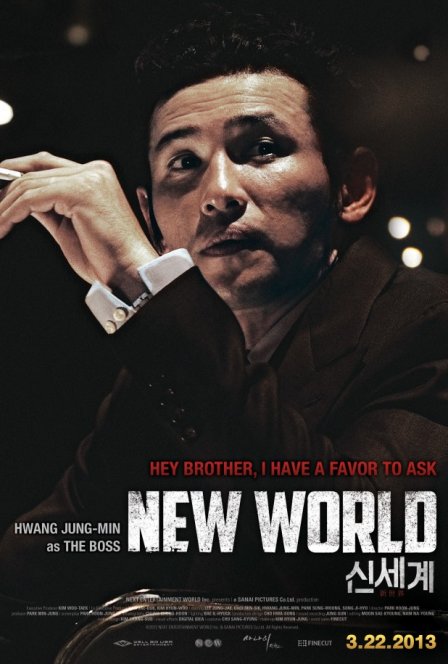Hoon-jung Park’s latest film (the second he’s directed) is as much about universality as it is about double-crosses, high-level corruption, loyalty, and revenge. A story ostensibly about an unmoored deep cover policeman working South Korean organized criminals and all the crazy and harrowing situations that arise from his tenuous position, New World does double-duty as a measured and fascinating rumination on the nature of loyalty, honor, friendship, and if the three can have any worth when their object happens to be truly ghastly. Although, this high-minded preoccupation with situational ethics does not in any way detract from the bracing, violent, humorous, and unabashedly entertaining tone of the film.
When we first meet Ja-Seong (Lee Jeong-jae), he’s been undercover with the Goldmoon crime syndicate (South Korea’s largest) for round about a decade, tasked with digging up as much dirt as possible on the higher-ups within the organization. He’s got a civilian wife with no idea what he does for a living, and a baby on the way. Up for a transfer to a presumably safe detail and new identities for his young family, Ja-Seong is the embodiment of shrewdness, always on top of shit in his role as an enforcer and general counsel to one of the syndicate’s underbosses. His straight-man proclivities are sharply and amusingly contrasted with his boss and sort-of best friend, Jeong Cheong’s (Hwang Jeong-min) antics. Obsessed with garish displays of wealth, drinking, and having a good time at all costs, Jeong’s moments of slapstick humor have this weird way of not at all easing any of the tension that holds the film together. Rather, each time he does something profoundly goofy, you’re just waiting for some correlatively horrible shit to go down.
Ja-Seong’s handler, Kang, a superior officer on the police force, is a delightfully hard-assed and virtually nihilistic burnt out case. Played absolutely flawlessly by Choi Min-sik (Oldboy), Kang’s demands of Ja-Seong become increasingly untenable, his credibility steadily eroding as he keeps moving the goal post of Ja-Seong’s transfer farther and farther out. Park does a stellar job of keeping his audience guessing as to whether the fact that Kang’s a scumbag will have any bearing on the overall merit of his mission and the mission of his protégé. Fairly early on we understand Park’s not at all interested in setting up one organization as inherently better than the other owing to its being inherently more licit.
The natural inclination in the kind of labyrinthine storytelling Park does with this film is to find some kind of insidious evil force (bureaucratic, personal, or otherwise) underpinning all of the human suffering requisite in pulling the story off well. However, writing the screenplay for 2010’s I Saw the Devil pretty squarely established Mr. Park’s credentials as someone able to clear the hurdles of his chosen genre. Run like a corporation, there’s nobody at Goldmoon you could really blame entirely for all of their terrible crimes, and the same can be said for Kang’s police force. While the evil in this film is cold and impersonal, the underlying goodness of some of Park’s key characters only makes sense in terms of their relationship to each other, and these relationships, much more than revenge and violence (of which there’s plenty) are what propel the story.
It has to be said that the violence in New World is quite a bit more refined than in Park’s previous efforts. There’s still a fair amount of gore to go around in this movie, one particularly squirm-inducing scene involving a barely-alive woman stuffed unceremoniously into a 55-gallon steel drum destined for the bottom of the East China Sea. However, the majority of the truly gory business takes place off-screen. Perhaps Park’s signature obsession with violence is taking a turn towards the more erudite? Either that or he’s getting soft, which is a ridiculous thing to try and hold in your head.
Whereas with I Saw the Devil Park limned a world almost hopelessly lacking in human goodness or honor, New World is chiefly concerned with the possibility and necessary worth of such things. Far from being an uplifting or remotely cheerful film, there are nevertheless fragments of genuine bonhomie and nearly altruistic kindness. In keeping with the best of modern Korean cinema, Park deftly crafts a compelling, thought-provoking, and inventive film which also works and entertains on even the most basic visceral levels.

